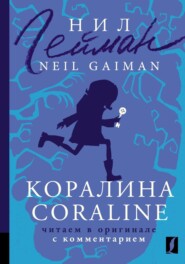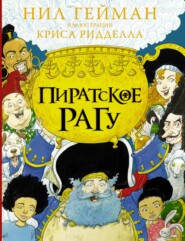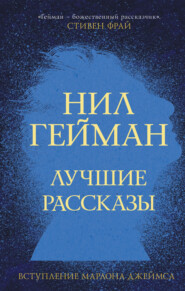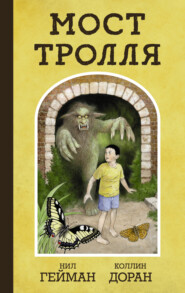По всем вопросам обращайтесь на: info@litportal.ru
(©) 2003-2025.
✖
Interworld
Настройки чтения
Размер шрифта
Высота строк
Поля
But you see the problem. I don’t have what my aunt Maude used to call a “bump of direction.” If anything, I’ve got a hollow where the bump should be. Forget knowing north from south or east from west—I have a hard enough time telling right from left. Which is all pretty ironic, considering how things turned out . . .
But I’m getting ahead of myself. Okay. I’m going to write this like Mr. Dimas taught us. He said it doesn’t matter where you start, as long as you start somewhere. So I’m going to start with him.
It was the end of the October term of my sophomore year, and everything was pretty normal, except for Social Studies, which was no big surprise. Mr. Dimas, who taught the class, had a reputation for unconventional teaching methods. For midterms he had blindfolded us, then had us each stick a pin in a map of the world and we got to write essays on wherever the pin stuck. I got Decatur, Illinois. Some of the guys complained because they drew places like Ulan Bator or Zimbabwe. They were lucky. You try writing ten thousand words on Decatur, Illinois.
But Mr. Dimas was always doing stuff like that. He made the front page of the local paper last year and nearly got fired when he turned two classes into warring fiefdoms that tried to negotiate peace for an entire semester. The peace talks eventually broke down and the two classes went to war on the quad during free period. Things got a little carried away and a few bloody noses resulted. Mr. Dimas was quoted on the local news as saying, “Sometimes war is necessary to teach us the value of peace. Sometimes you need to learn the real value of diplomacy in avoiding war. And I’d rather my students learned those lessons on the playground than on the battlefield.”
Rumor at school was that he was going to be canned for that one. Even Mayor Haenkle was pretty annoyed, seeing as how his son’s nose was one of the ones bloodied. Mom and Jenny—my younger sister—and I sat up late, drinking Ovaltine and waiting for Dad to come home from the city council meeting. The squid was fast asleep in Mom’s lap—she was still breast-feeding him back then. It was after midnight when Dad came in the back door, tossed his hat on the table and said, “The vote was seven to six, in favor. Dimas keeps his job. My throat’s sore.”
Mom got up to fix Dad some tea, and Jenny asked Dad why he’d gone to bat for Mr. Dimas. “My teacher says he’s a troublemaker.”
“He is,” Dad said. “—Thanks, hon.” He sipped the tea, then went on. “He’s also one of the few teachers around who actually cares about what he’s doing, and who has more than a spoonful of brains to do it with.” He pointed his pipe at Jenny and said, “Past the witching hour, sprite. You belong in bed.”
That was how Dad was. Even though he’s just a city councilman, he has more sway among some people than the mayor does. Dad used to be a Wall Street broker, and he still handles stocks for a few of Greenville’s more prominent citizens, including several on the school board. The councilman job takes only a few days a month most of the year, so Dad drives a cab most days. I asked him once why he did it, since his investments keep the wolf from the door even without Mom’s home jewelry business, and he said he liked meeting new people.
You’d think that nearly getting fired might’ve thrown a scare into Mr. Dimas and gotten him to back off a little, but no such luck. His idea for this year’s Social Studies final was pretty extreme even for him. He divided our class into ten teams of three each, blindfolded us again—he was big on blindfolds—and had a school bus drop us off at random places in the city. We were supposed to find our way to various checkpoints within a certain time without maps. One of the other teachers asked what this had to do with Social Studies, and Mr. Dimas said that everything was Social Studies. He confiscated all cell phones, phone cards, credit cards and cash so we couldn’t call for rides or take buses or cabs. We were on our own.
And that was where it all began.
It’s not like we were in any real danger—downtown Greenville isn’t downtown LA or New York or even downtown Decatur, Illinois. The worst that might happen would be an old lady clobbering us with her purse if one of us was foolish enough to try to help her across 42nd Avenue. Still, I was partnered with Rowena Danvers and Ted Russell, which meant that this was going to be interesting.
The school bus pulled away in a cloud of diesel smoke and we took our blindfolds off. We were downtown—that much was obvious. It was the middle of the day, a chilly October afternoon. Traffic, both foot and car, was pretty light. I immediately looked for the street sign, which said we were on the corner of Sheckley Boulevard and Simak Street.
And I knew where we were.
This was such a surprise that I was tongue-tied for a moment. I was the kid who could get lost going to the corner mailbox, but I knew where this was—we were standing right across the street and down the block from the dentist, where Jenny and I had both had our teeth cleaned just a couple of days before.
Before I could say anything, Ted pulled out the card Mr. Dimas had given each of us on which was written the location where we were to be picked up. “We have to get to the corner of Maple and Whale,” he said. “Hey, maybe we can get your dad to pick us up, Harker.”
This is all you have to know about Ted Russell: He wouldn’t be able to spell “IQ.” Not because he’s dumb— which he is, as a bag of rocks—but because he couldn’t be bothered. He was a year older than me, due to having been kept back. I knew I would get nothing but the kind of jokes even grade-schoolers would roll their eyes at from him. But I was willing to put up with Russell, obnoxious jerk that he was, to be here—to be anywhere—with Rowena Danvers.
I suppose there may have been prettier, smarter, just generally nicer girls at Greenville High, but I’d never bothered looking for them. As far as I was concerned, Rowena was the only girl for me. But after two years of trying, I had failed to convince Rowena that I was anything more than a minor extra in the movie of her life. It wasn’t that she hated me, or even disliked me—I wasn’t important enough to warrant that. I doubt that we’d exchanged more than five sentences during the entire school year, and probably four of those five were along the lines of “Excuse me, but you dropped this” or “I’m sorry, were you sitting here?” Not exactly the stuff of which great romances are made, although I treasured every one of them.
But now, just maybe, I could change that. I could become more than an anonymous blip on her radar. I was practically fifteen, and she was my honest-to-goodness First Love. I mean it. Or I thought I did at the time. It wasn’t just a crush. I wasn’t simply in love with Rowena Danvers—I was madly, deeply, passionately in love. I even told my parents how I felt, and that took guts. If she ever noticed me, I said to them, this would be one of the great love affairs of the century. They could see I was serious, and they didn’t even tease me. They got it. They wished me luck. I would be Tristran and she would be Iseult (whoever they were; that was what Dad said); I would be Sid and she would be Nancy (whoever they were; that was what Mom said). I wanted to impress Rowena Danvers, and so what if demonstrating that I knew how to cross a street in the right direction wasn’t exactly the stuff that Shakespeare was made of? I’d take what I could get.
I said, “I know where we are.”
Ted and Rowena looked at me dubiously. “Yeah, right. I’d sooner put the blindfold back on. Come on, Rowena,” Ted said, taking her arm. “Everybody knows that Harker couldn’t find his butt with both hands tied behind him.”
She pulled her arm free and looked at me. I could see that she didn’t relish walking five or six blocks with Ted Russell, but that she also didn’t want to be wandering around downtown for the rest of the day. “Are you sure you know where we are, Joey?” she asked.
The woman I loved was asking me for help! I felt like I could have found my way home from the dark side of the moon. “No problem,” I said with all the confidence of a lemming who thinks he’s headed for a nice day at the seashore. “Follow me. Come on!” And I started down the street.
Rowena hesitated a moment more, then turned away from Ted and started walking after me. He stared after her in shock for a moment, then waved his arm in a “g’wan!” gesture. “Your funeral. I’ll tell Dimas to send out search parties,” he shouted, then he laughed and pumped the air.
It must be nice to be your own audience.
Rowena caught up with me, and we walked on for a while in silence. We crossed Arkwright Park and headed north—I think—on Corinth.
Within six blocks I realized something very important: It’s good to know where you are, but it’s better to know where you’re going. Which I definitely did not—in a matter of minutes I was more lost than I’ve ever been. And, what was worse, Rowena knew it. I could tell by the way she was looking at me.
I was starting to panic. I didn’t want to let Rowena down. But I also didn’t want her to see me with egg on my face. So I said, “Wait here just a minute,” and I ran on ahead before she could say anything.
I was desperately hoping to find another street or landmark that I recognized. I turned the corner and saw a building at the end of the next block that looked familiar, so I started down the street—Arkwright Boulevard, next to the park—to make sure.
The weather in Greenville is weird at the best of times. It comes of being so close to the Grand River, which gave us the beer-brewing industry and the tourists who come down to walk the nature trail and to see the falls, but also gives us the mists that spread around the town whenever it gets chilly.
One of those mists started at the corner of Arkwright and Corinth. I headed straight into it, felt it beading cold on my face. Most mists thin when you’re in them. This one didn’t. It was more like walking through thick smoke, blinding and gray.
I just pushed through it, not really noticing it much— after all, I had more important things on my mind. From the inside of the mist I could see shimmering lights of all different colors. It’s weird what a town looks like when all you can see are the lights.
I turned the next corner onto Fallbrook and stepped out of the mist—and stopped. I was in a part of town I didn’t recognize at all. Across the street was a McDonald’s I’d never seen before, with a huge green tartan arch above it. Some kind of Scottish promotion, I guessed. Weird. I noticed it, but it didn’t really register. I was too busy thinking about Rowena, and wondering whether there was any way to explain what had happened that wouldn’t leave her thinking I was a complete idiot. There wasn’t. I was going to have to head back to her and confess that I had gotten us both completely lost. I was looking forward to it about the same way I look forward to a routine dental checkup.
At least the fog was almost gone when I got back to the cross street, panting and out of breath. Rowena was still waiting where I had left her. She was staring into the window of a pet shop, with her back to me. I ran straight across the street, tapped Rowena on the shoulder and said, “I’m sorry. Guess we should have listened to Ted. That’s not something you hear often, is it?”
She turned around.
When I was a kid—I mean, just a little kid, back in New York, back before we moved to Greenville, before Jenny even—I remember following my mom through Macy’s. She was doing her Christmas shopping, and I could have sworn that I barely took my eyes off her. She was wearing a blue coat. I followed her all around the store until the press of people scared me and I grabbed her hand. And she looked down. . . .
And it wasn’t my mom at all. It was some woman I’d never seen before, who was wearing a similar blue coat and had the same hairstyle. I started crying and they took me off to some office and gave me a soda and found my mom and it all ended happily enough. But I’ve never forgotten that moment of dislocation, of expecting one person and seeing another.
That was what I was feeling now. Because it wasn’t Rowena in front of me. It looked like her, as much as a sister might, and her clothes were the same. She was even wearing a black baseball cap, just like Rowena’s.
But Rowena had always been real vain about her long blond hair. She’d said more than once that she wanted to let it grow as long as it could and never cut it.
This girl wore her blond hair in a buzz cut—real short. And she didn’t even look like Rowena. Not really. Not when you were up close. Rowena’s eyes are blue. This girl had brown eyes. She was just some girl in a brown coat and a black baseball cap, looking at puppies in a pet store window. I was totally confused. I backed away. “I’m sorry,” I said. “I thought you were someone else.”
She was looking at me like I had just climbed out of the sewer wearing a hockey mask and carrying a chain saw. She didn’t say anything.
“Look, I’m really sorry,” I told her. “My bad. Okay?”
She nodded without saying anything, and she walked away down the sidewalk until she reached the cross street, glancing behind her every few moments. Then she ran as if all the hounds of hell were after her.
I wanted to apologize for spooking her, but I had my own problems.
I was lost in downtown Greenville. I had gotten separated from the other two members of my unit. I had surrendered all my change. I’d failed Social Studies.
There was only one thing to do, so I did it.
I took off my shoe.
Under the inner sole was a folded five dollar bill. My mom makes me keep it there for emergencies. I took out the five bucks, put my shoe back on, got some change and got on a bus for home, rehearsing all the things I could say to Mr. Dimas, to Rowena, even to Ted, and wondering whether I’d get lucky in the next twelve hours and somehow manage to contract a disease so contagious that they’d have to keep me out of school until the end of the semester. . . .
I knew that my troubles wouldn’t be over once I got home. But at least I wouldn’t be lost anymore.
As it turned out, I didn’t even know the meaning of the word.
(#ulink_7acf81fa-0a7a-55be-af97-883eaed43889)

















